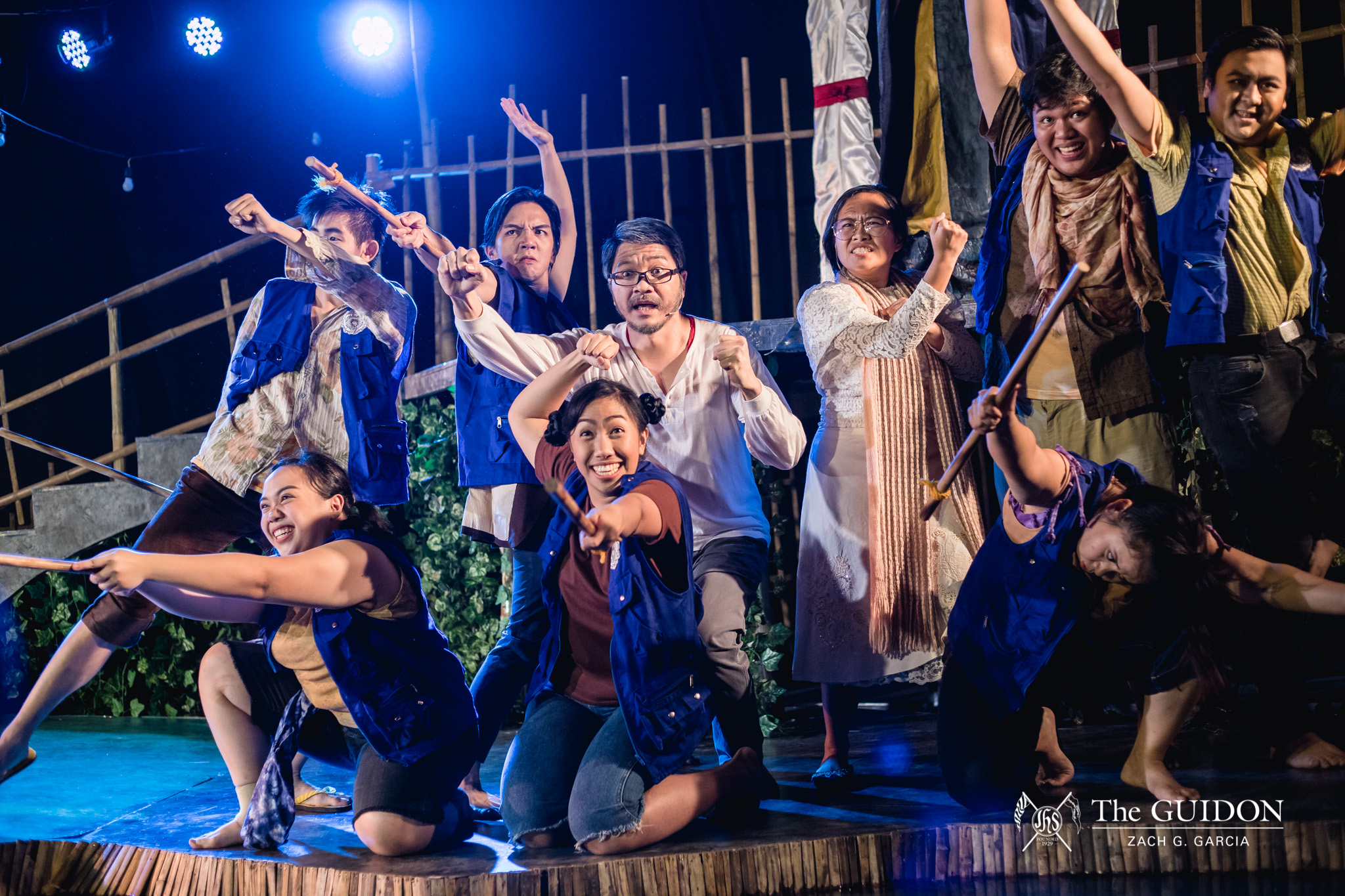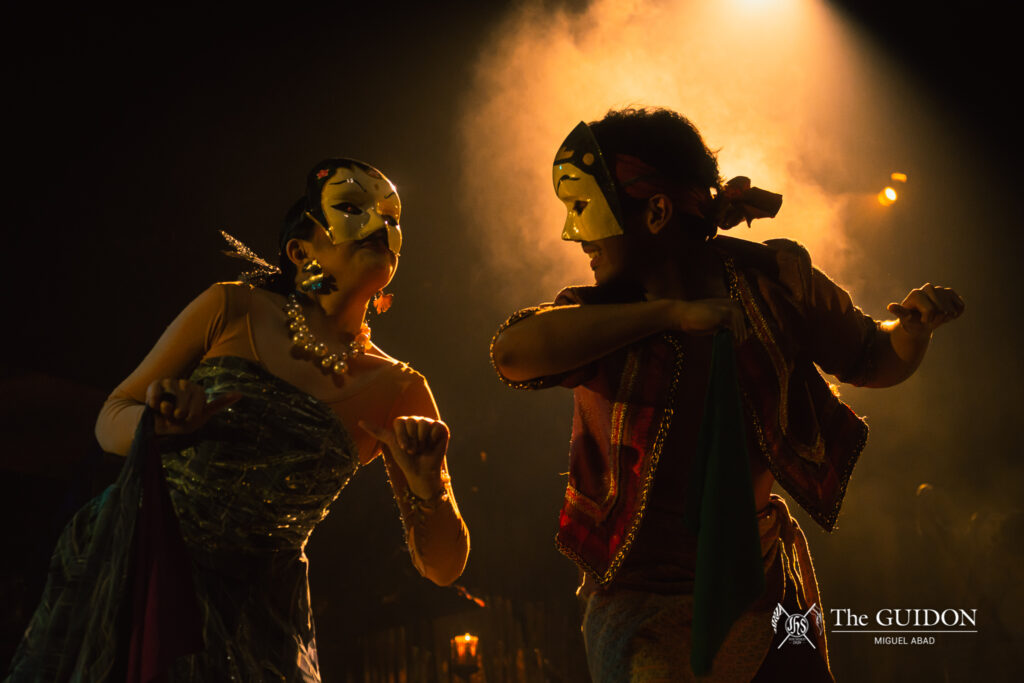We live in an age where deceit for one’s own gain overshadows the truth. Such is the case when fake news and political fraud are rampant in our society, bringing us farther from what is real. Ang Pitong Gunggong by Ateneo ENTABLADO portrays the unending struggle of seeking truth and finding a way to live in harmony. Although it presents itself as lighthearted and vaudeville-esque entertainment, the show remarkably draws on severe issues in the country’s political situation, all told through a satirical lens.
Directed by Jethro Tenorio and written by Christine Bellen and Tyron Casumpang, the play unfolds around seven young dimwits who seek enlightenment in the town of Santa Iluminada. They are known as Talakitok (alternates Mark Legaspi and Jan Rey Escano), Galunggong (alternates Jerome Ignacio and JM Punzalan), Engelbert (alternates Deli Del Rosario and Austin Gonzales), Romyo (alternates Gio Gahol and Vino Mabalot), Galicia (alternates Virlynn Ramirez and Aikecon Rodriguez), Lala (alternates Iman Ampatuan and Aubrey Salazar), and Tarantina (alternates Lemelen Palad and Thea Acosta).
Along the way, they meet Papa D (alternates John Michael Cuepo and Ariel Diccion), the leader of the Santa Iluminada townspeople who promises to lift them out of poverty within a few months. Little do they know, however, that Papa D and his followers have devised a treacherous plan of stealing the statue of Santa Iluminada by taking advantage of the seven dimwits.
Ridiculous antics ensue from the get-go, as viewers are introduced to the seven dimwits, who are foolish to the point that they can’t even correctly do a headcount. Almost every scene is injected with well-timed, pop-culture-infused jokes that has the audience continually bursting into fits of laughter. All jokes aside, viewers are reminded that this isn’t just a show about fools who get into all sorts of nonsensical situations; even when they are weak and powerless under the supremacy and influence of Papa D and his henchmen, they do not stop their quest towards finding enlightenment. Through earnest dialogue and the convincing portrayal of characters, the show conveys the crookedness and fraudulence that characterize many of our politicians, the ones who have sworn to protect their people and strive for the betterment of the country.
The production is extraordinary for several reasons, one being its potency to immerse its audience in the show. Mark Legaspi’s set strongly portrays rural Filipino culture that draws viewers into the town of Santa Iluminada, which includes a nipa hut, a raised platform resembling giant crocodile where most of the happenings take place, and a surrounding pool of water where front-row audience members get splashed at in certain scenes. Rather than watching from afar, viewers are up close and get to enjoy being in the action itself, where characters invite them to be invested in the world of the play. It is also interspersed with catchy musical performances that further engage the audience in the play’s bustling atmosphere, especially the LSS-inducing theme song of Papa D. On another aspect, the costumes give a sense of the characters’ place and status in their society, in which the Santa Iluminada townspeople are dressed in shabby garments while Papa D and his loyal supporters wear stylish clothing that bear a resemblance to outfits worn by the infamous public figures that they parody.
The greatest strength of Ang Pitong Gunggong is undoubtedly the acting. Director Jethro Tenorio has guided an excellent cast to a vibrant portrayal of their characters. Each of the seven dimwits has their own distinct personalities, in which the absurdity and foolishness of each of their actions has the audience in stitches. The portrayal of Papa D is also excellent. His actions and mannerisms—from his foul-mouthed nature to his unfulfilled promises—emulates Duterte who we have come to know throughout his presidential reign, and has quickly garnered the most chuckles that night. Madam Chulala (alternates Dane Figueroa and Gigi Matubis), one of Papa D’s loyal supporters, is an equally impressive performance. One can instantly tell that she is a parody of Mocha Uson through her absurd sexual innuendos and iconic phrases. Some of the cast members, however, are often inaudible and difficult to understand, but their lively actions and facial expressions make it easier to interpret and follow the story. All in all, the commitment of the cast to their respective roles has treated viewers to a show that not only has heart and soul, but also makes it a genuine joy to watch.
Overall, Ang Pitong Gunggong is a timely and relevant play that depicts how power can be abused at the expense of the marginalized members of society. A hilarious and engaging story that blends political commentary with lighthearted fun, it brings to light problems we face in the community through memorable portrayals and the immersive experience it brings upon its audience. More importantly, it is a reminder that even if we are powerless and far from the truth, one should not cease in seeking what will help us move forward in this period of darkness.
Rating: 5/5






